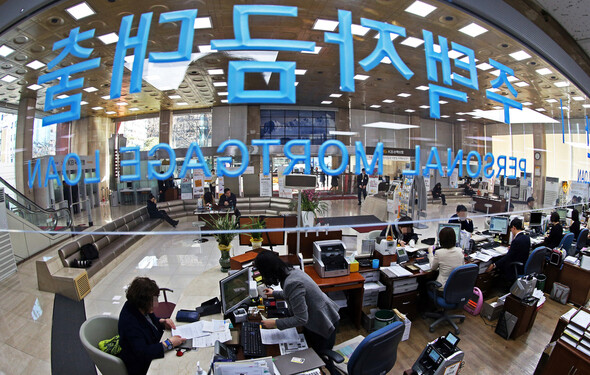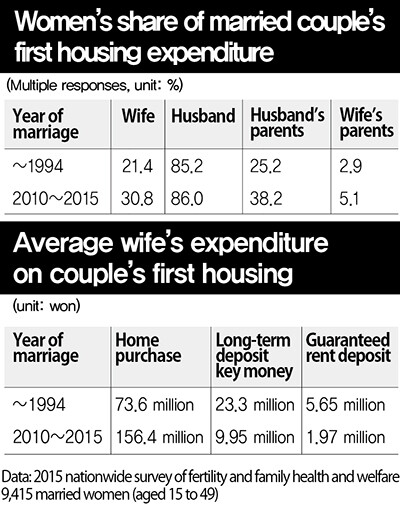hankyoreh
Links to other country sites 다른 나라 사이트 링크
More and more women contributing to buying newlyweds’ first home

Among women who have married during the past six years, 31% have shouldered some of the financial burden of renting or purchasing the couple’s first home. As housing prices have increased to the point that men cannot afford to cover them alone, the traditional idea that men should pay for housing while women should furnish the home is also changing.

On July 11, the Korea Institute for Health and Social Affairs (KIHASA) released the results of its survey into conditions of the country‘s fertility and family health and welfare for 2015. According to the results, 26.3% of the 9,415 married women (aged 15 to 49) surveyed answered that they had contributed toward the cost of housing.
This statistic increases based on how recent the marriage was. Among women who married in 1994 or earlier, 21.4% said that they paid for housing. Among those who married between 2010 and 2015 the number rose to 30.8%. Within the same period of time, the percentage of men’s parents who contributed rose from 25.2% to 38.2%, while the percentage of women’s parents who helped out increased from 2.9% to 5.1%. Men’s financial burden remained essentially unchanged, rising from 85.2% to 86%. As housing costs skyrocket, the financial burden on women has inevitably increased, while dependence on parents is higher than in the past, as well.
In reality, the cost of acquiring housing for newlyweds has increased substantially over the past 20 years. The price of owning a home has jumped from an average 73,640,000 won (US$64,054) up until 1994 to 156,450,000 won (US$136,001) between 2010 and 2015. The average deposit required for a rental has increased from 23,390,000 won (US$20,329) to 99,500,000 won (US$86,480) during the same period. Increased housing costs for newlyweds have also resulted in a big increase in the instances of loans taken out by one member of the couple, from 8.7% to 37.4%. The size of the average loan has also increased, from 16,410,000 won (US$14,265) up until 1994 to 54,940,000 won (US$47,759) between 2010 and 2015.
The cost of housing is one of the main reasons single men avoid marriage. When 446 unmarried men aged 30 to 44 were asked why they had not yet married, 17.2% responded that they had not found a partner who met their expectations, 10.9% answered that their income was too small, 8.6% said that they had no opportunity to meet potential partners, 8.3% responded that they had not secured housing and 7.9% answered that married life was too expensive.
“While in the past, it was thought that the man alone was obligated to secure the newlywed‘s house, these days the responsibility tends to fall on the women and even their parents, as well,” Lee Sam-sik, KIHASA senior researcher, said. “As this reality is closely related to continuously rising housing costs, the financial burden of married life has a big influence on attitudes toward marriage among single people,” Lee added.
By Hwangbo Yon, staff reporter
Please direct questions or comments to [english@hani.co.kr]

Editorial・opinion
![[Guest essay] The real reason Korea’s new right wants to dub Rhee a founding father [Guest essay] The real reason Korea’s new right wants to dub Rhee a founding father](https://flexible.img.hani.co.kr/flexible/normal/500/300/imgdb/original/2024/0423/8317138574257878.jpg) [Guest essay] The real reason Korea’s new right wants to dub Rhee a founding father
[Guest essay] The real reason Korea’s new right wants to dub Rhee a founding father![[Column] ‘Choson’: Is it time we start referring to N. Korea in its own terms? [Column] ‘Choson’: Is it time we start referring to N. Korea in its own terms?](https://flexible.img.hani.co.kr/flexible/normal/500/300/imgdb/original/2024/0423/3617138579390322.jpg) [Column] ‘Choson’: Is it time we start referring to N. Korea in its own terms?
[Column] ‘Choson’: Is it time we start referring to N. Korea in its own terms?- [Editorial] Japan’s rewriting of history with Korea has gone too far
- [Column] The president’s questionable capacity for dialogue
- [Column] Are chaebol firms just pizza pies for families to divvy up as they please?
- [Column] Has Korea, too, crossed the Rubicon on China?
- [Correspondent’s column] In Japan’s alliance with US, echoes of its past alliances with UK
- [Editorial] Does Yoon think the Korean public is wrong?
- [Editorial] As it bolsters its alliance with US, Japan must be accountable for past
- [Guest essay] Amending the Constitution is Yoon’s key to leaving office in public’s good graces
Most viewed articles
- 1[Column] ‘Choson’: Is it time we start referring to N. Korea in its own terms?
- 2Senior doctors cut hours, prepare to resign as government refuses to scrap medical reform plan
- 3Why Korea shouldn’t welcome Japan’s newly beefed up defense cooperation with US
- 4Opposition calls Yoon’s chief of staff appointment a ‘slap in the face’
- 5[Guest essay] The real reason Korea’s new right wants to dub Rhee a founding father
- 6Terry Anderson, AP reporter who informed world of massacre in Gwangju, dies at 76
- 7[Column] The clock is ticking for Korea’s first lady
- 8[Editorial] Japan’s rewriting of history with Korea has gone too far
- 9New AI-based translation tools make their way into everyday life in Korea
- 10Survey: S. Koreans spend more time using smartphones than eating